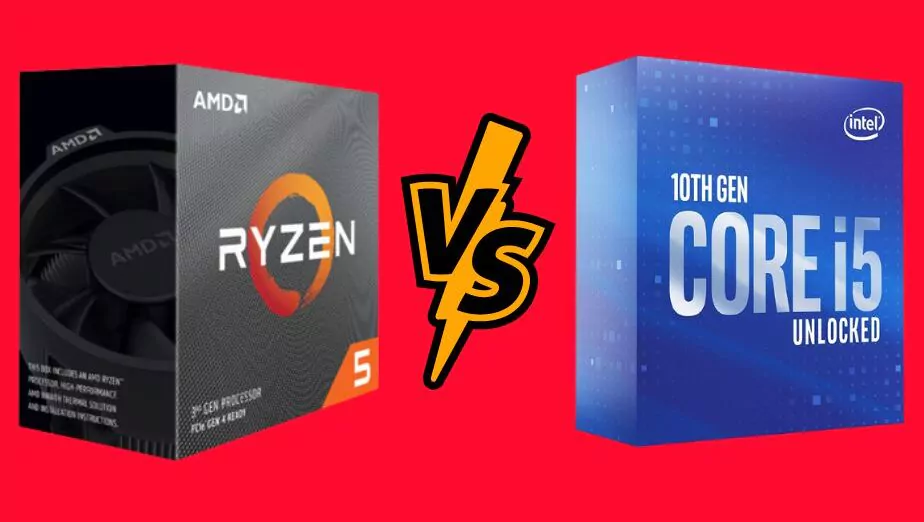10 Amazing Ryzen 5 vs i5 Myths Explored

In the current market, the Ryzen 5 and Intel Core i5 are two popular mid-range processors. Both processors are powerful and offer good performance for gaming, video editing, photo editing, and other tasks that require processing power. In this detailed comparison, we will cover all the important differences between Ryzen 5 vs i5, including their core performance, power consumption, integrated graphics, and more.
1 Intel core i5 processor VS AMD Ryzen 5
The AMD Ryzen 5 is an AMD CPU that offers excellent performance at a reasonable price. It has more cores and threads than the i5, which makes it great for multitasking and other tasks that require more processing power. The Ryzen 5 has a higher base clock speed than the i5, which makes it a better choice for tasks that require raw performance.
On the other hand, the Intel Core i5 is a powerful processor that comes with high power efficiency and offers good performance for light gaming, video editing, photo editing, and other tasks that require processing power. The i5 Intel CPU has a lower TDP (thermal design power) than the Ryzen 5, which means it is more energy efficient and produces less heat.
Core Performance
When it comes to core performance, the Ryzen 5 has more cores and threads than the i5. The Ryzen 5 has six cores and 12 threads, while the i5 has four cores and eight threads. This means that the Ryzen 5 is better at multi-core tasking and can handle more demanding tasks with ease.
Base Frequency and Clock Speed
The Ryzen 5 has a higher base clock speed than the i5. The Ryzen 5 5600X has a higher clock speed of 3.7 GHz, while the i5-11600K has a base clock speed of 3.9 GHz. This means that the Ryzen 5 is better for tasks that require raw performance, such as gaming or video editing.
Cache Memory
The Ryzen 5 has more cache memory than the i5. The Ryzen 5 5600X has 35MB of cache memory, while the i5-11600K has 12MB of cache memory. This means that the Ryzen 5 can access data faster, resulting in better performance in some tasks.
Integrated Graphics
Both the Intel Core i5 and Ryzen 5 have integrated graphics, but the Intel chip has a clear advantage in this area. The i5-11600K has Intel UHD Graphics 750, which is a dedicated graphics card that offers good performance for light gaming and other graphics-intensive tasks. On the other hand, the Ryzen 5 5600X has no integrated graphics, so that you will need a dedicated graphics card for gaming or other graphics-intensive tasks.
Power Consumption and Efficiency
The Ryzen 5 has a higher TDP than the i5, which means it consumes more power and produces more heat. The Ryzen 5 5600X has a TDP of 65 watts, while the i5-11600K has a TDP of 125 watts. This means that the Ryzen 5 may require a better CPU cooler to prevent overheating, which can increase the cost of building a gaming PC.
Future Proof
In terms of future-proofing, both the Ryzen 5 and i5 offer good performance and are expected to last for several years. However, the i5-11600K has an advantage in this area, as it supports the latest Intel technologies, such as Intel Octane memory, Thunderbolt 4, and Wi-Fi 6E. On the other hand, the Ryzen 5 supports PCIe 4.0, which is faster than PCIe 3.0, supported by the i5.
Gaming Performance
When it comes to gaming performance, both the Ryzen 5 and i5 offer good performance. The Ryzen 5 is better at gaming when paired with a dedicated graphics card, as it has a higher base clock speed and more cores than the i5. The i5 is also good for light gaming and other graphics-intensive tasks, thanks to its integrated graphics.
Video Editing and Photo Editing
The Ryzen 5 has an advantage in video editing and photo editing tasks thanks to its higher core count and cache memory. These tasks benefit from multiple cores and fast data access, which the Ryzen 5 provides. However, the i5 is also good for these tasks, especially if paired with a dedicated graphics card for hardware acceleration.
Power Efficiency and Operating Temperature
The i5 is more power efficient than the Ryzen 5, thanks to its lower TDP. This means it consumes less power and produces less heat, which can result in lower operating temperatures. This can be important for laptops or other systems where battery life and heat management are important.
Other Components and Compatibility
When choosing between the Ryzen 5 and i5 Intel processor, it’s important to consider other components in your system. The Ryzen 5 requires a new motherboard with an AM4 socket, while the i5 requires a new motherboard with an LGA 1200 socket. You may also need to consider the compatibility of other components, such as RAM, with your chosen CPU.
2 The Clear Winner: Intel Processors vs AMD processor
Overall, both the Ryzen 5 and i5 are powerful processors that offer good performance for mid-range systems. The Ryzen 5 has an advantage in multitasking and tasks that require more processing power, while the i5 is more power efficient and better for light gaming and other tasks that don’t require as much processing power.
In terms of gaming performance, the Ryzen 5 is a better choice when paired with a dedicated graphics card, while the i5 is better for graphics-intensive tasks thanks to its integrated graphics.
When it comes to future-proofing, both processors offer good performance and are expected to last for several years. The i5 has an advantage in this area, thanks to its support for the latest Intel technologies.
3 Wrapping up
Ultimately, the choice between Ryzen 5 vs the Intel i5 depends on your specific needs and budget. Both processors offer good performance, and it’s worth pointing out that the differences between them are relatively small. However, if you’re looking for a clear winner, the Ryzen 5 offers more cores and cache memory, while the i5 provides better power efficiency and integrated graphics.
FAQ's about Ryzen 5 vs i5
Is Ryzen 5 better than i5 11th gen?
It’s difficult to make a direct comparison between AMD Ryzen 5 and Intel Core i5 11th gen processors, as their performance can vary depending on the specific models and tasks being performed. However, here are some factors to consider when comparing these processors:
Core count: AMD Ryzen 5 processors generally have more cores than Intel Core i5 processors, which can provide better multi-threaded performance for tasks such as video editing, 3D rendering, and other multi-threaded applications.
Clock speed: Intel Core i5 processors generally have higher clock speeds than Ryzen 5 processors, which can provide better single-threaded performance for tasks such as gaming and other single-threaded applications.
Power consumption: Ryzen 5 processors generally have lower power consumption than Intel Core i5 processors, which can lead to lower energy bills and longer battery life for laptops.
Price: AMD Ryzen 5 processors are generally less expensive than Intel Core i5 processors, which can make them a better value for budget-conscious consumers.
Is Ryzen faster than Intel?
It’s difficult to make a blanket statement about whether AMD Ryzen processors are faster than Intel processors, as their performance can vary depending on the specific models and tasks being performed.
In recent years, AMD has made significant strides in improving the performance of their Ryzen processors, particularly in multi-threaded tasks. This has made Ryzen processors a popular choice for tasks such as video editing, 3D rendering, and other multi-threaded applications.
On the other hand, Intel processors still tend to offer better single-threaded performance, which can be beneficial for tasks such as gaming and other single-threaded applications.
Is Ryzen better than Intel for daily use?
Both AMD Ryzen and Intel processors are well-suited for daily use, such as browsing the web, streaming videos, working with office applications, and other common tasks.
In terms of general performance, Ryzen processors generally offer better multi-threaded performance, which can be beneficial for tasks such as video editing, 3D rendering, and other multi-threaded applications. However, Intel processors still tend to offer better single-threaded performance, which can be beneficial for tasks such as gaming and other single-threaded applications.
Community Q&A
About This Article
This article has been viewed 1070 times.



